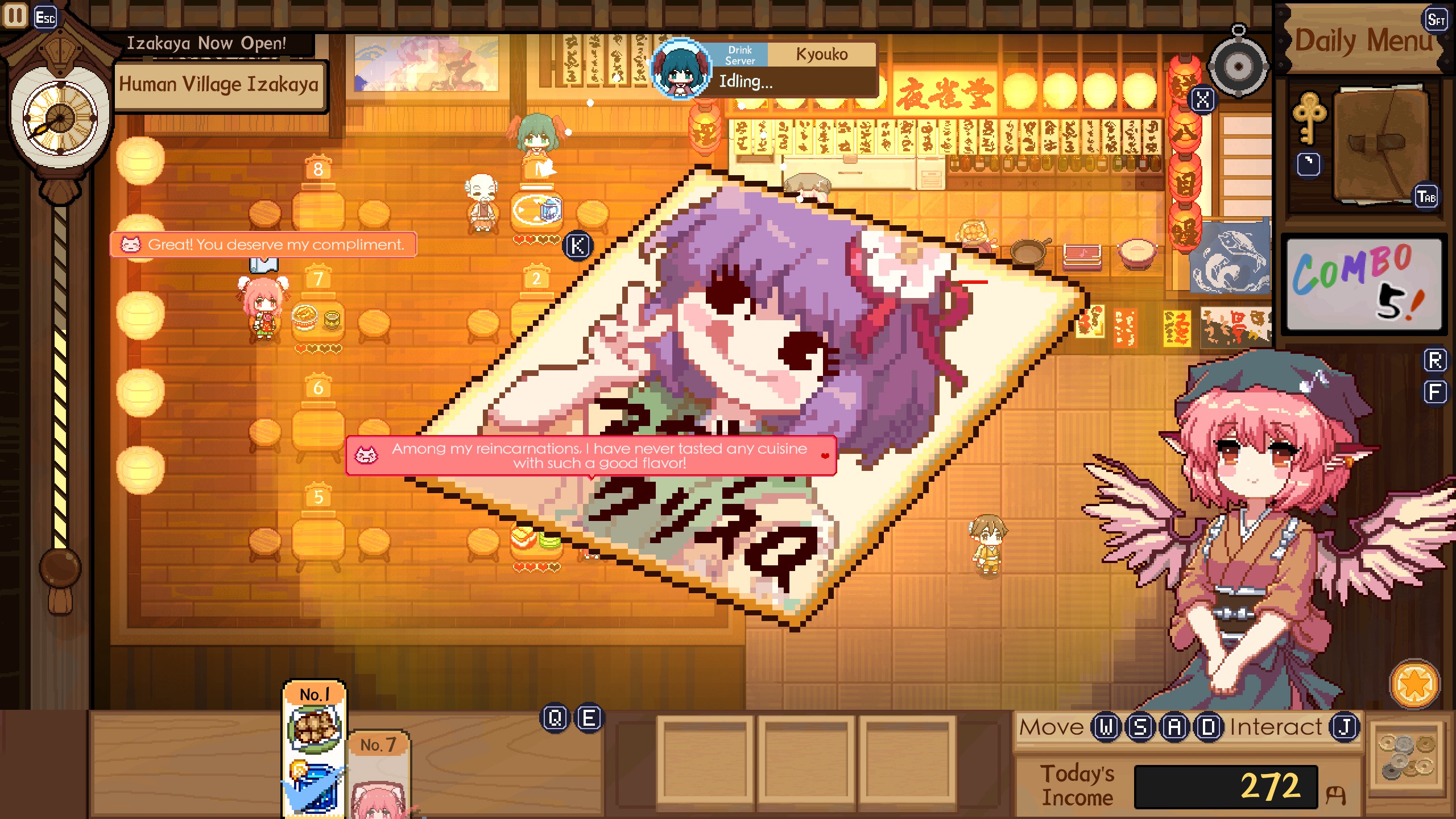Who's Mystia and what's an Izakaya?
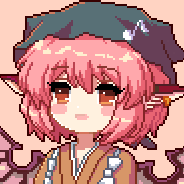 The Proprietress!
The Proprietress!
Touhou Mystia's Izakaya is a Touhou fangame developed by doujin circles 二色幽紫蝶 Dichromatic Ghostly Purple Butterfly?? and Re零同人社 Re:Zero Doujin Group?? in 2021, with 5 DLC expansions released up through early 2024, and language support in English, Japanese, Chinese, and Korean.
Starring youkai night sparrow Mystia Lorelei, the gameplay features running and expanding a successful night-time Izakaya It's like a pub or tavern style restaurant. throughout various locales in Gensokyo!
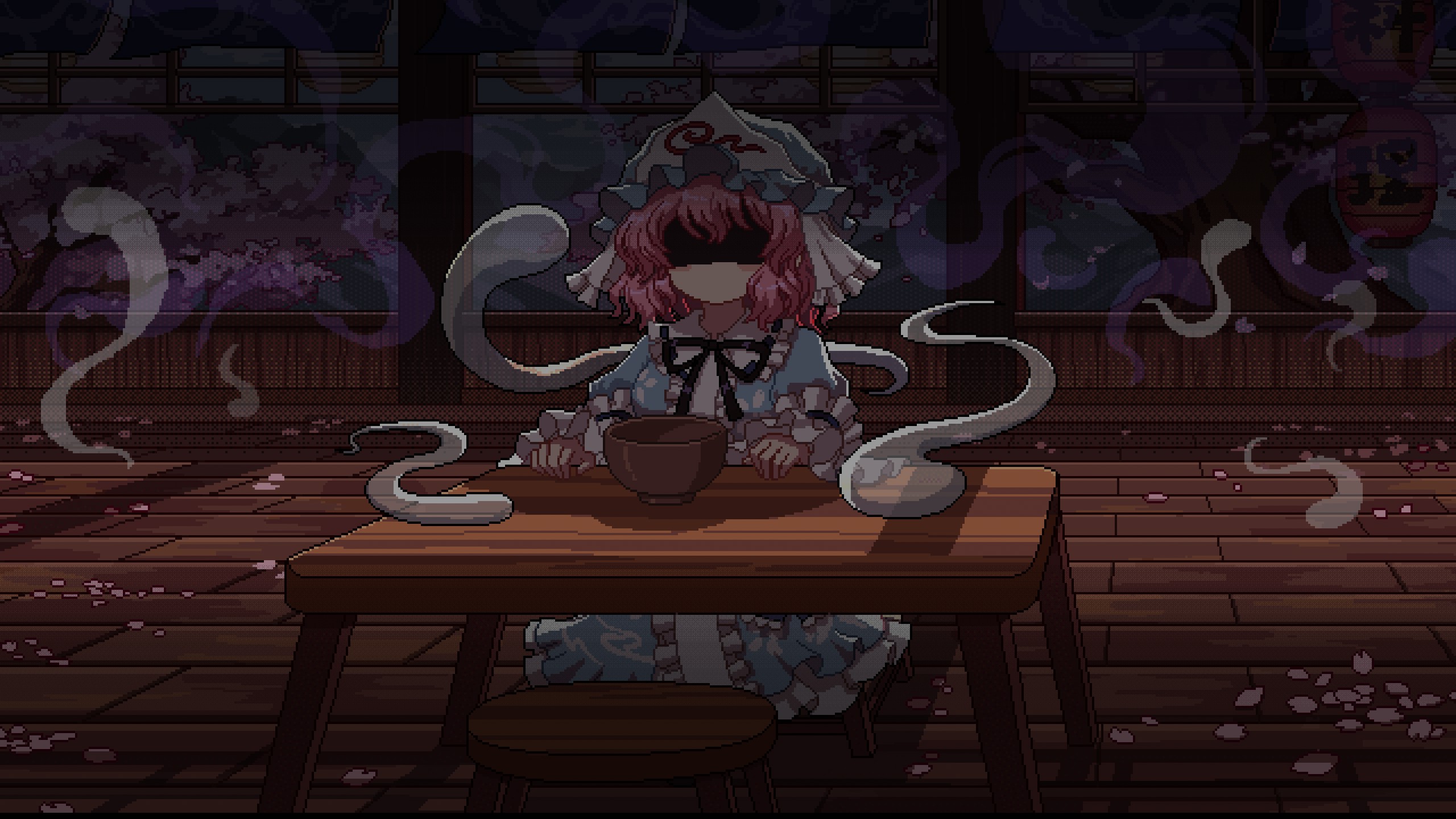
Whatever it takes.
Yeah, I've done a Touhou or two before
None of those words mean anything to me
(Much of what I am going to say in this vein will echo the sentiments I share with a certain GensouChronicle on youtube, whose review inspired me to pick up the game in the first place. If you prefer a video overview, I highly recommend paying him a visit!)
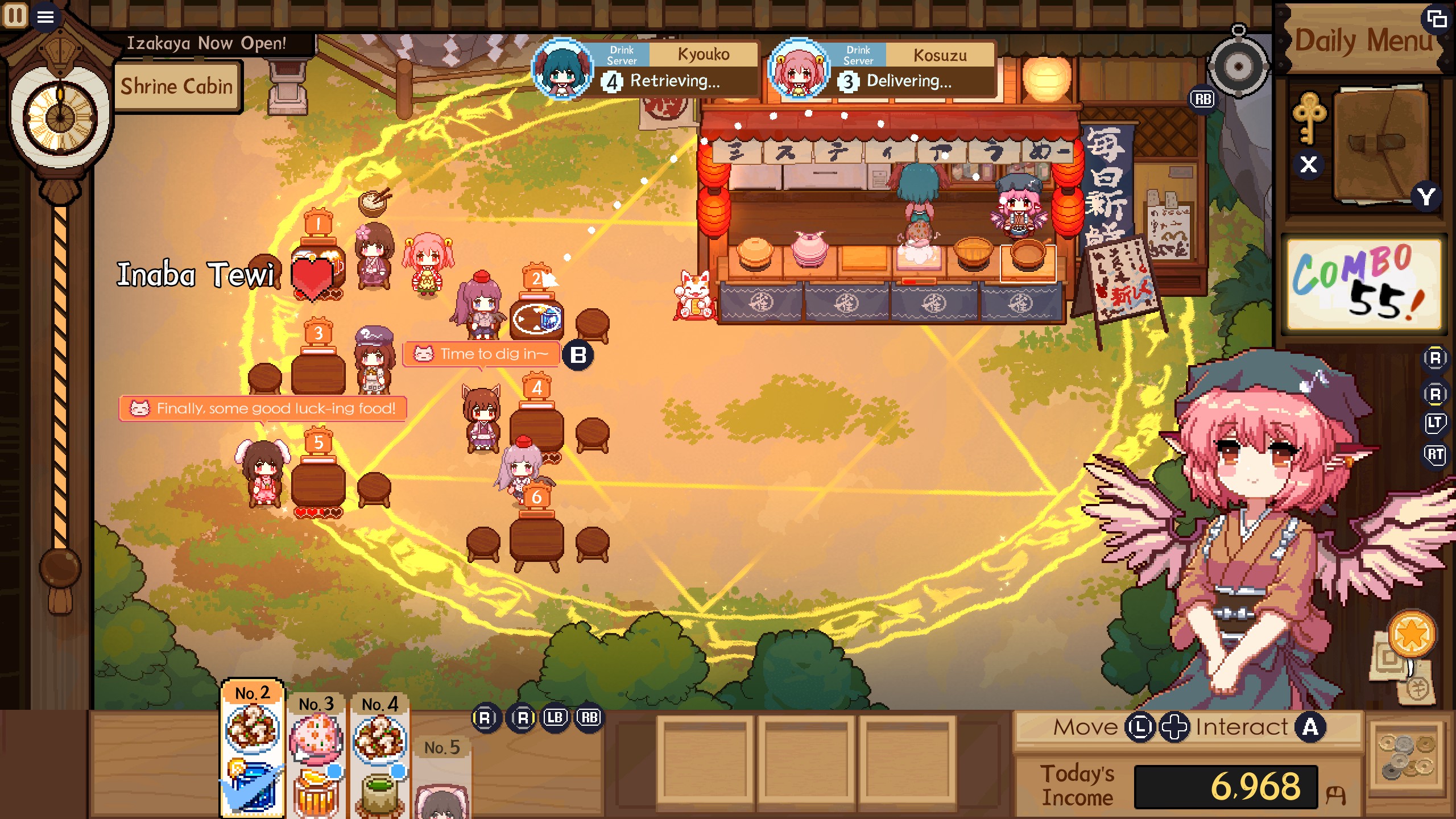
In my opinion, Mystia's Izakaya embodies the ideal spirit of a Touhou fangame: it pays homage and respect to the series canon proper, while carving its own identity in fanon and original ideas that really set it apart from its origins.
The gameplay alone could make a decent game - a restaurant sim with unique characters whose preferences you learn to memorize as your repertoire slowly broadens. It's honestly executed quite well for this alone.
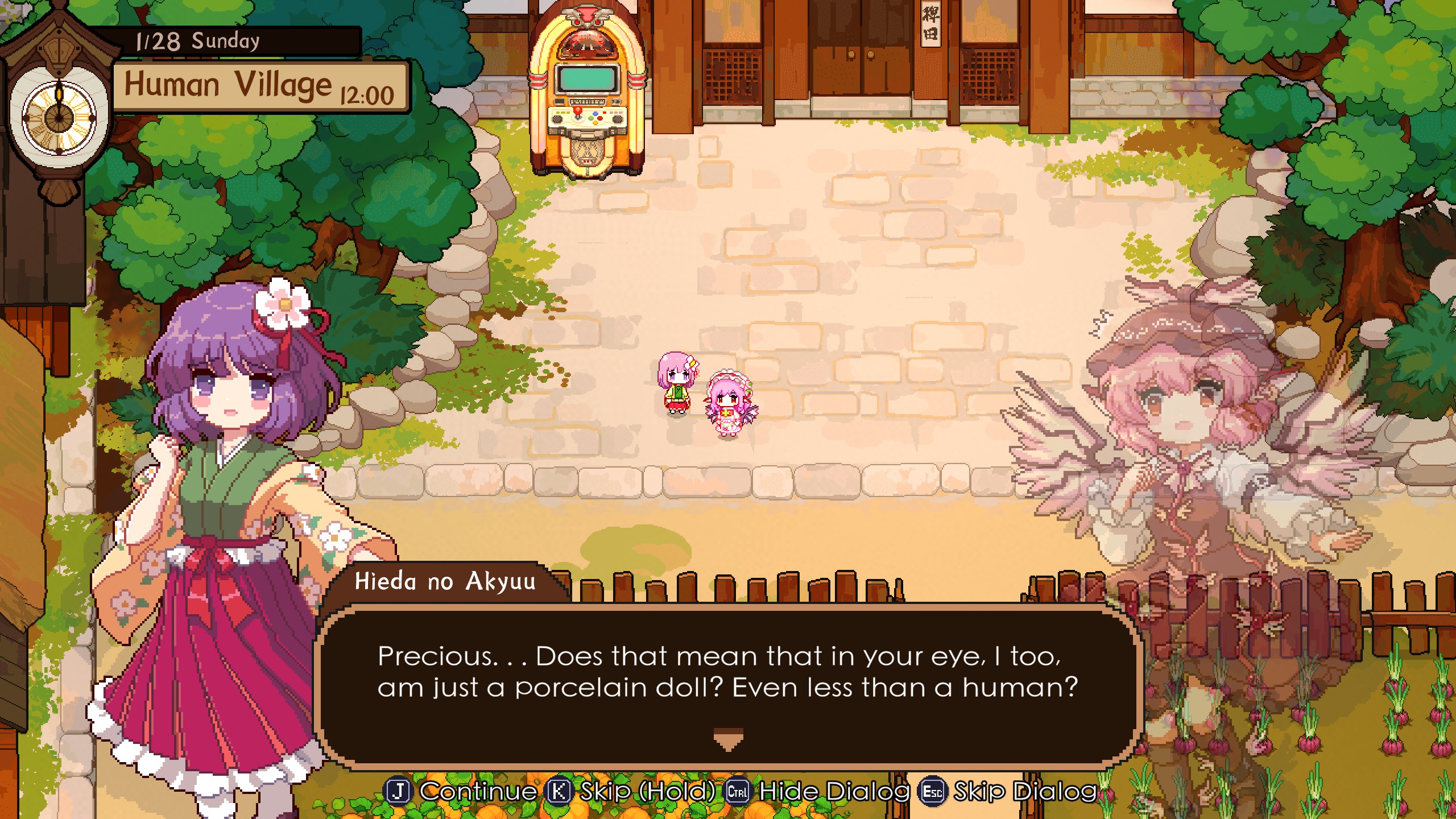
But where I think it really shines is lining all these elements up to really showcase the series cast. During the daytime, Mystia walks around different areas of Gensokyo to collect ingredients or chat up the locals, eventually meeting prominent characters from the main series. Through just their short dialogues, they are characterized convincingly, hitting not just the surface-level aspects of their personalities, but deeper personal aspects the more Mystia gets to know them.
The writing in this game leans away from parody fanon for the most part, with the sort of dialogue that makes it almost feel like it could come from an official work itself. Each character story that advances throughout the game days is an arc unto itself, fully utilizing the uniquely narrow perspective Mystia has with a "mere" stage 2 boss level of notoriety. Because of the peaceful genre, she isn't simply brushed away, but she is also frequently far out of her depth with characters who normally wouldn't give her the time of day.
For example, Reimu appears as an aggressive, no-nonsense, and even kind of hypocritical antagonist, which properly translates the kind of casual violence she commits as the series' peacemaker. To Mystia, who might as well be cannon-fodder, she represents a looming threat to her existence early on, and stays relatively out of reach for small-fry like her. It could have just stuck with this and played into it for simple humor, but instead the game diverges from canon to ask: what kind of situation arises from a youkai like Mystia becoming a more prominent addition to her life?
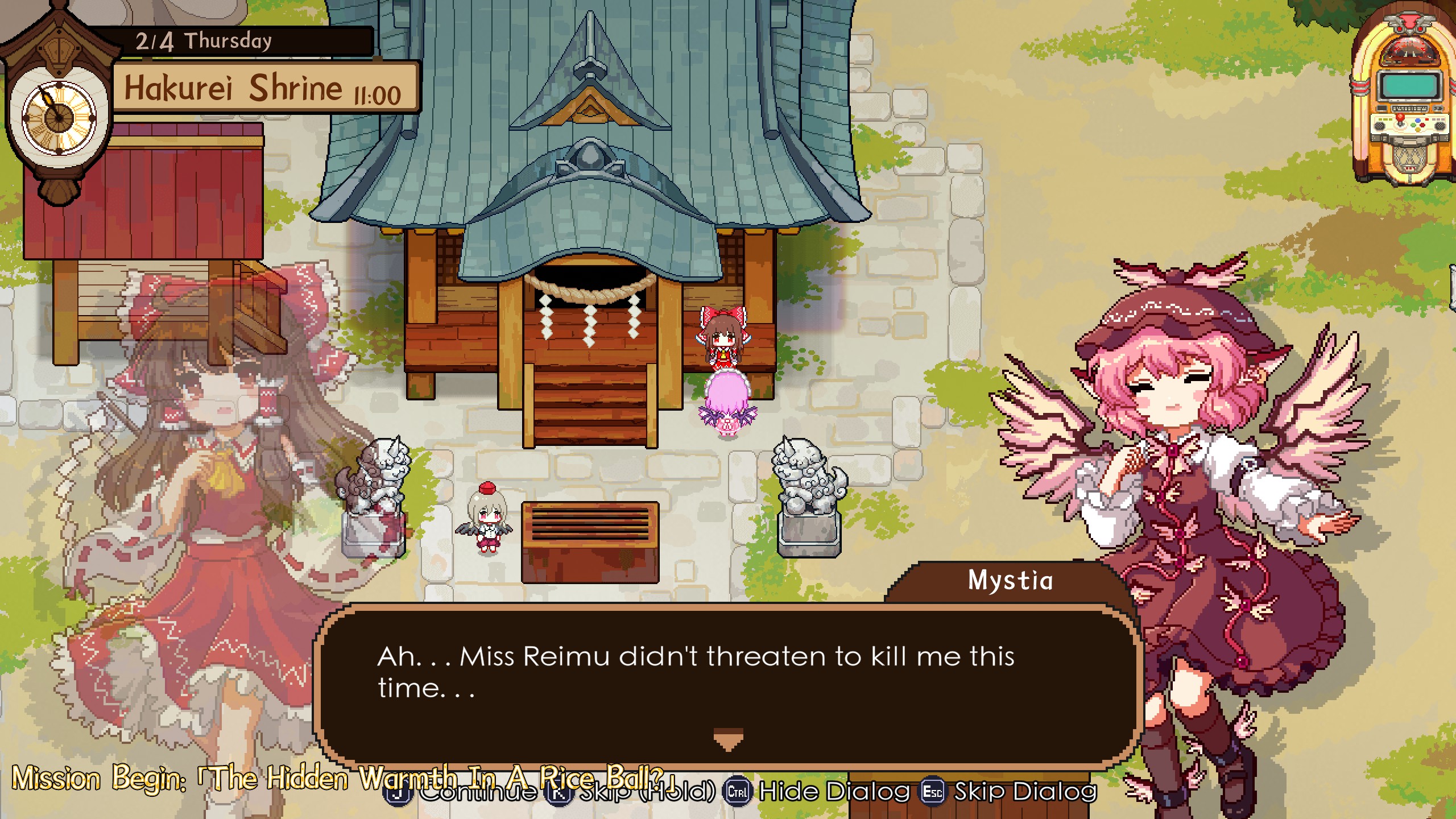
And this kind of question has actually been answered quite often in canon. Every major incident contributor has had to get on good terms with the series protagonist to ensure their continued existence, in a very literal sense. But honestly, it's fun every time, and can turn out to be a pretty touching story.
It's a very common theme to visit the idea of Reimu not just as a person, but a central fixture of the setting, a gathering point for the chaotic balance of peace between wildly conflicting forces in their all-accepting fantasy land - entities that gave up their bids for power over the acquaintance of a single human. But the game tells even this story better than I could convey, and in a way uniquely suited to its simple-at-a-glance themes.
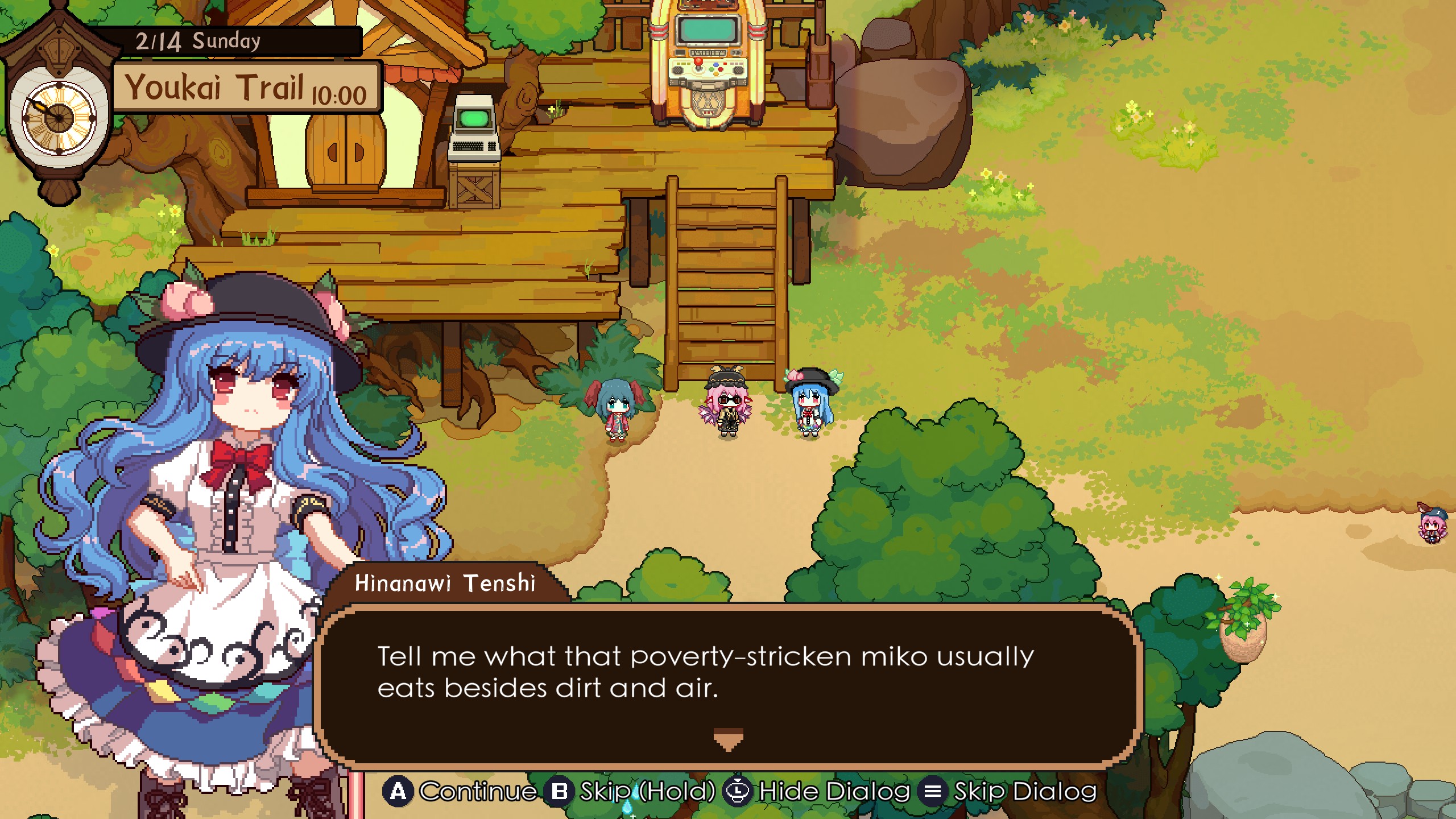
That's just one of the examples of the micro character stories the game tells over time, but all of them have been really nice and show a deeper understanding of not just their lore, but their appeal as individuals. It tells of Akyuu's distant role as an observer to her own life, of the troubles that lie beneath Marisa's cheerful front, of the not-so-subtle rationale behind Tenshi's involvement with mortals. All of this framed around a bird just trying to do her best to run a food stall for them.

I really ought to have a "What is Touhou?" page on here for how much I'm going to eventually talk about its works, but... I can run through that pretty quickly right now.
Ready?
The Touhou Project is a famous, long-running series by Team Shanghai Alice Famously just one man: ZUN of mainly vertical "bullet hell" shooters or "Danmaku", curtain-fire set within Gensokyo, a fictional land in Japan where forgotten ideas and mythological beings without believers are allowed to thrive. The Windows-era Skipping five PC-98 era games now considered non-canon main series currently* (*2024) consists of 14 numbered games, each detailing some "incident" threatening the relative peace of the region in various ways, which is always resolved in one way: a series of spellcard battles.
The series is perhaps best known for its music and huge cast of characters, which has inspired one of the single largest fan communities in the Japanese doujin scene. ZUN has always believed in the spirit of derivative works, allowing hundreds of fan circles to freely create their own music, art, and games based directly on the series' settings and characters, within reason. The Touhou series also has several licensed written works and separate music CD's, each of which comes with their own standalone stories that run in parallel to the main series canon. (This is relevant information!)
Coming back to this game itself: the titular character Mystia Lorelei is the Stage 2 boss of Touhou 8: Imperishable Night, debuting in a one-off gimmick fight in which she limits the player's visibility with her ability to cause song-induced night-blindness. Since her introduction to the series, additional details within the written works have revealed that she runs a grilled lamprey stand out in the forest in her spare time, and even joined a rock band with Kyouko Kasodani - a character based on the yamabiko youkai, a personification of mountain echoes. Mystia's Izakaya seeks to expand on just these very few points about Mystia herself.
Did you get all that? No...? Okay it's actually not that important.
Even though I manually wrote all of that myself.
Even for non-fans of the series, the gameplay is fun, cute, a little addicting, and something I have personally spent over 80 hours playing despite its simplicity.
The gameplay loop is fairly simple - collect ingredients and chat up your neighbors during the day, and arm yourself with cookware at night. You are responsible for keeping inventory and catering to the tastes of your regular (and supernatural) clientele, as well as advertising and learning about your most important patrons. There's little on the "management" side, mostly because you actually have very little help in the restaurant phase - essentially feeding dozens of customers by yourself, with just a little bit of help from your friends.
Yet despite a deadline ticking down by day, your store getting busier, and the dishes ever more complex, the game never really leaves you in the dust. You start basically from scratch and gain access to more and more capability at a very natural pace:
Day 1 you have a single venue, less than a handful of recipes, at most 3 guests at a time, with the occasional rare guest that has unique demands.
Several game-months in, you'll have something like 10 venues with differing clientele, 50+ recipes and drinks to choose from, 8 guests at a time that each stay for repeat orders, and a consistent 4-5 guests with particular demands per night.
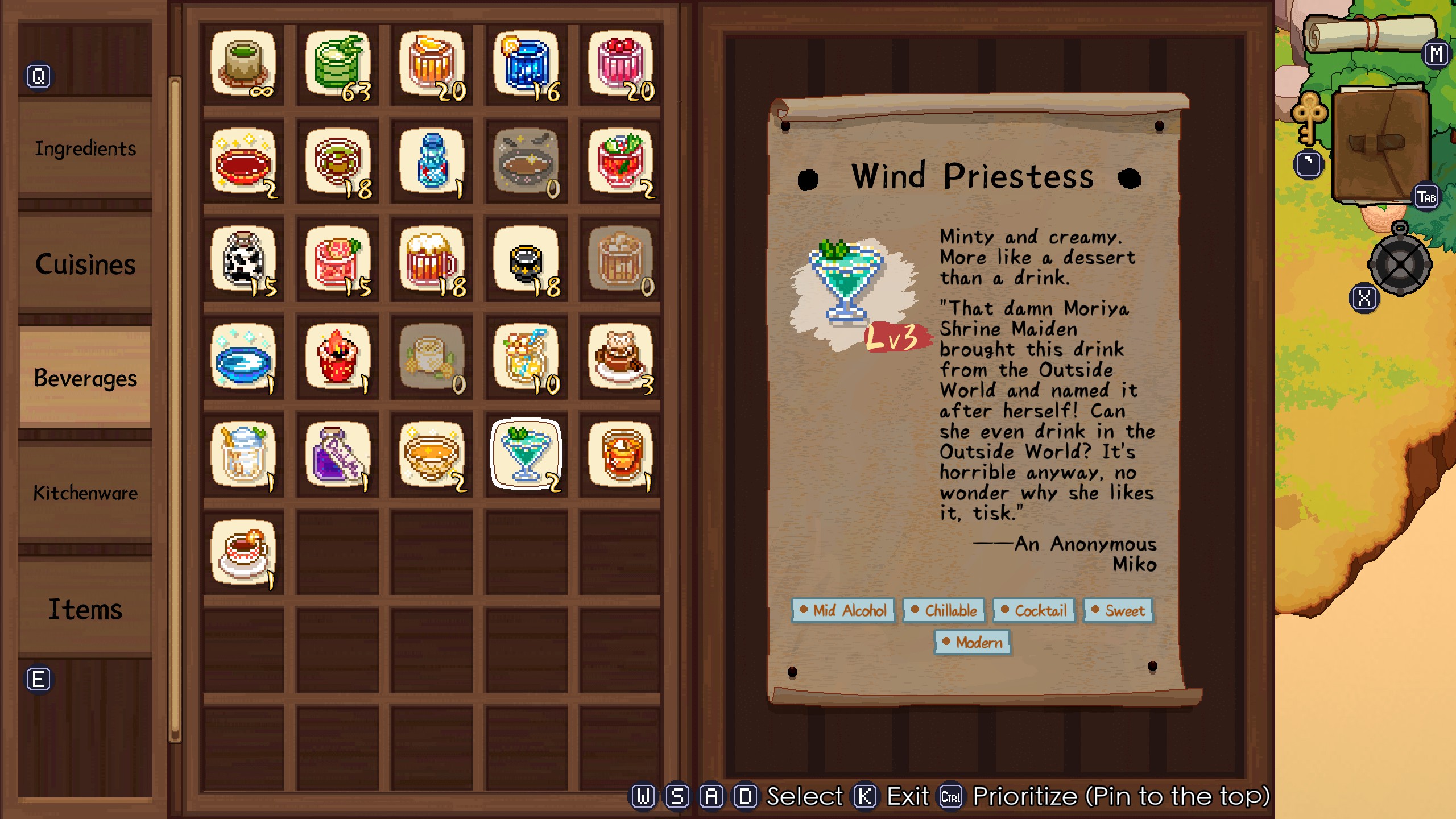
And yet, in my personal experience, it never once truly overwhelms you - even better, it encourages improvement, which makes you even more excited for each new addition to the stack.
Even in the early game, it gradually ramps up the difficulty, sometimes revealing ways to optionally up your game. It keeps resources low to get you in the habit of playing smart and performing well, so that by the time those things have been trivialized, the pavlovian game sense has already kicked in. It's too late. It feels too good to memorize your customers' tastes, to hear the jingle of a perfect order, like a rhythm game Which it also has! addict keeping up a full combo. To perfectly manage your ingredient stock day by day to afford piles of your most expensive dishes. To wring your rarer guests for their whole budget at minimal cost. You have become a gamer.
